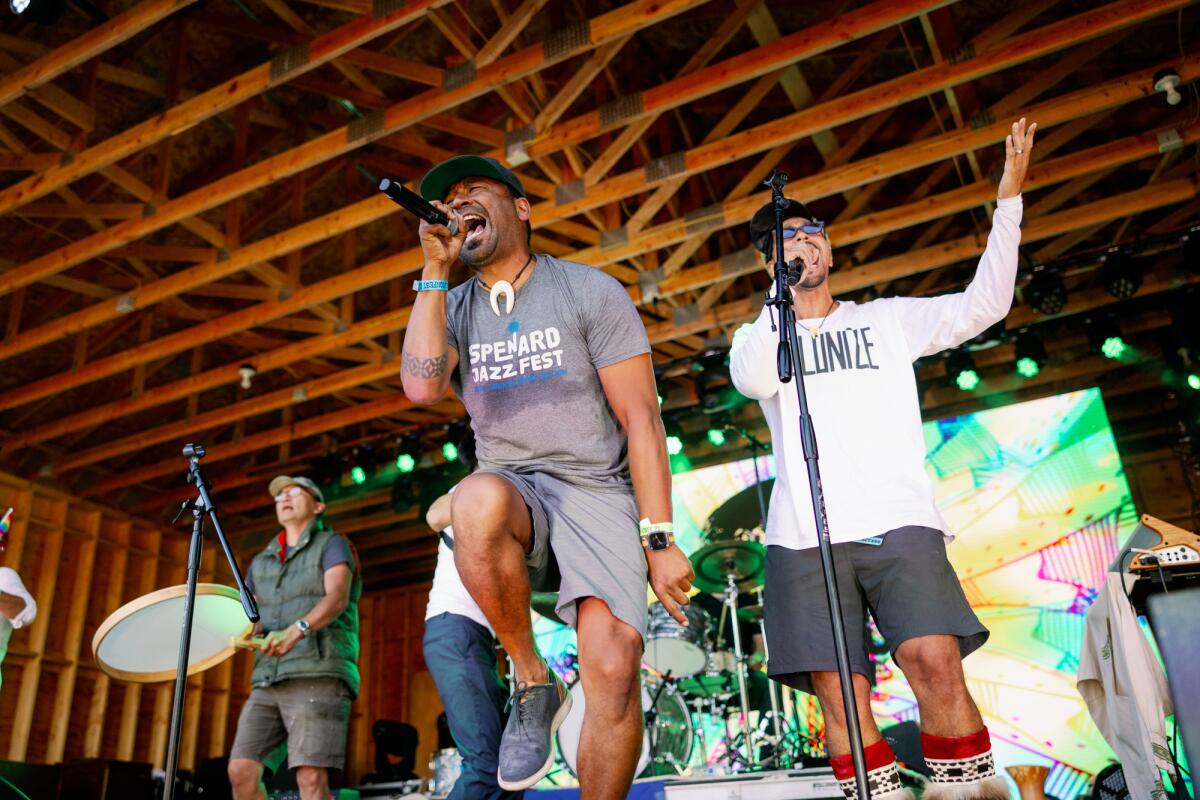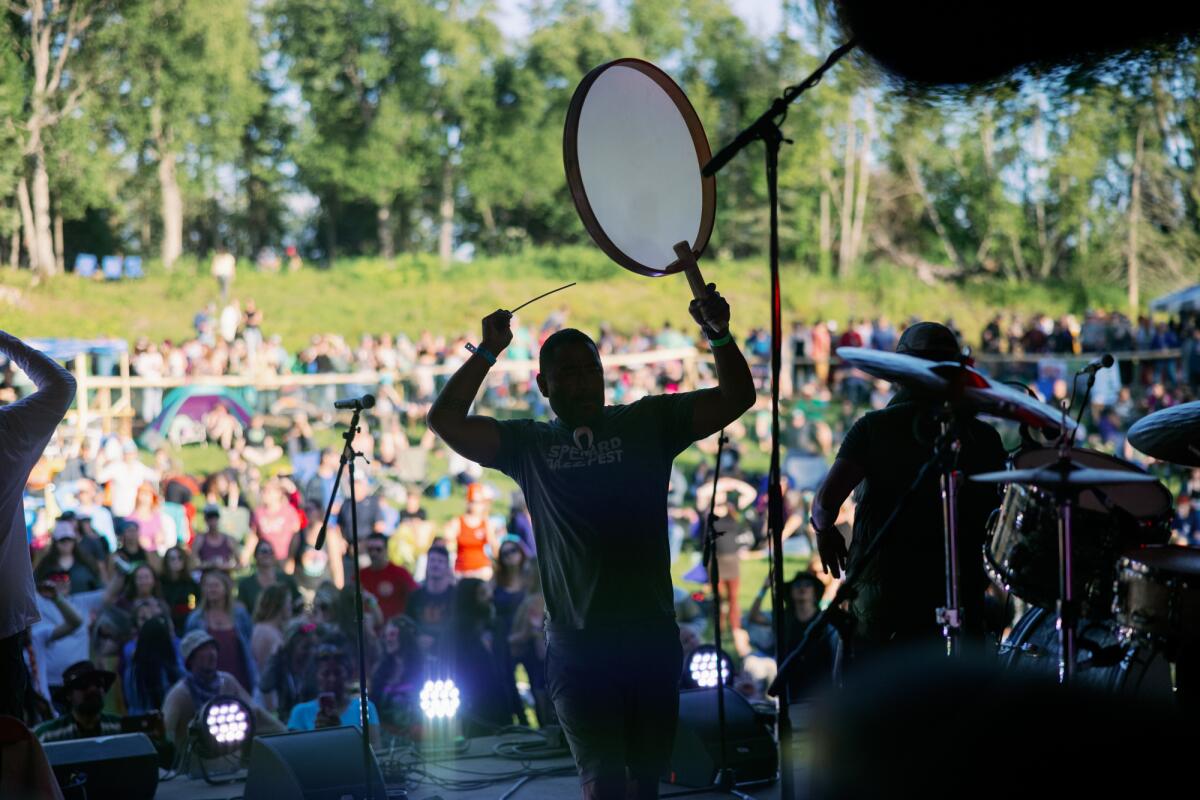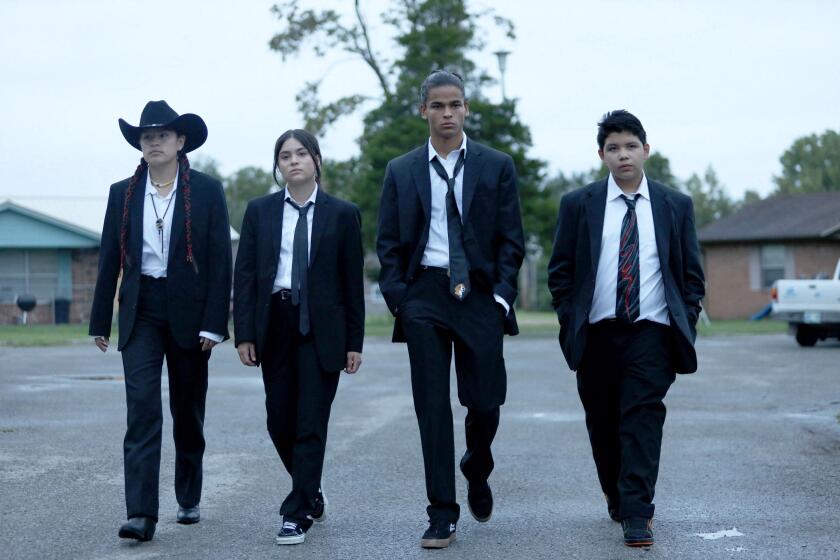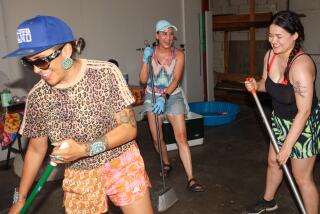Groove to Pamyua’s joyous ‘Inuit soul’ jams at L.A.’s new Global Music Festival

- Share via
Phillip Blanchett didn’t really sing in front of others as a kid. He had allergies, and breathing was difficult. He remembers doing a solo at his church once and, well, “I try not to say that it was traumatizing,” he says and laughs, “but it was humbling, let’s just say that.”
But once, when he was 19, he found himself singing praise music in Oakland as part of an enormous choir at a national conference for his denomination, the African Methodist Episcopal Zion Church. Something shifted inside him.
“It was so incredible,” Blanchett says, “because we grew up in a Black church, but with a really small Black population in Alaska.”
Back home in Bethel, Alaska, he excitedly told his older brother about the experience. Together they began singing childhood songs, old church songs and Inuit songs they grew up with in their Yup’ik family “and making them kind of gospelly,” says Blanchett. “We were really into R&B, like Jodeci and a lot of R&B crooner music at the time, so we were kind of mixing that into it.”
Singing led to harmonizing, then to dancing, “and that’s when we both heard something we had never heard before,” says Blanchett. Pamyua was born.
Pamyua — a Yup’ik Inuit word that means “encore” — will headline the new Los Angeles Global Music Festival on Saturday at the First Congregational Church of Los Angeles. The one-day event will present sacred music of cultures from around the world, and will also feature acts with Aztec and Indian roots. It also marks Pamyua’s first public concert in L.A.
Tanya Tagaq looks as if she’s having an out-of-body experience onstage.
The many villages in the delta of Bethel, or Mamterilleq in Yup’ik, are connected by rivers. For the Blanchett brothers — Phillip (Kilirnguq) and Stephen (Qacung) — sacred music is a unique confluence of two family streams. Their father, David, is a Black man from Philadelphia who, after serving in Vietnam, found himself stationed at Ft. Wainwright in central Alaska and started taking classes at the University of Alaska Fairbanks. That’s where he met Marie Meade, a native Yup’ik woman from the village of Nunapitchuk.
Their father would sing doo-wop and soul tunes around the house, and he bought each son a stereo receiver and CD players in the 1980s. As a preacher in the A.M.E. Zion Church, he also imparted his religion and an evangelistic fire on them. Their mother is a Yup’ik language instructor, translator and author of numerous publications about Yup’ik culture. Meade has spent her life gathering knowledge and stories from Yup’ik elders and spreading it worldwide.
R&B and Inuit music weren’t an inherently obvious pairing, Qacung says, but “the Yup’ik language, the way that it’s structured and formed, is very melodic. And we have very long words as well, so a Yup’ik word could be like a couple sentences or more in the English language. It has this sing-songy kind of feel, so it fits well with R&B.”
The brothers were both in college at the University of Alaska Anchorage when they started making this new music, and a year later they recruited Aassanaaq “Ossie” Kairaiuak — a drum-maker who grew up in the coastal village of Chefornak in a Yup’ik-speaking home — and formed a trio. Qacung and Kairaiuak were both working as school teachers at the time, and they decided to quit their jobs and make a real go of their band, Pamyua. They often still perform in schools, and the group’s original motto was: “Traditional contemporary multicultural entertainment.”
“Teaching is in everything that we do,” says Phillip — further evidenced by the drum-dance and choreography workshop they’ll provide at this week’s festival.
Pamyua were later joined by Karina Moeller, an Inuit musician from Greenland, and the Danish musician Kristoffer Jul Reenberg, who is “just a funkmaster jazz piano player,” says Phillip. “That really influenced our growth, musically.” (Moeller, who was married to Phillip Blanchett for a decade, is no longer an active member in the group.)

They quickly became the most famous Inuit band in Alaska, and they toured around the world — including the far reaches of Siberia — singing and dancing their potent, joy-filled blend of “Inuit soul.”
Besides contributing original songs, Kairaiuak has helped develop traditional Indigenous masks and costumes that Pamyua uses in performances. Pamyua has recorded several albums, but the band members say those are secondary to the onstage experience with an audience.
“We rely on the style that we were modeled from the traditional ways,” says Phillip, “which is really just smiling, and laughter and faces — things that you do that, in that moment, you can see the reaction that the other person gets, and you build off of that connection. ... It’s hard to translate that into a recording.”
“Almost impossible,” says Qacung.
More than a band, Qacung says, Pamyua is “a calling. A lot of musicians and a lot of bands are out there to be famous or make these songs, or whatever it is. And, for me especially, we’re making our music to save lives — to keep our culture alive, and to give our young people something that they can look up to and look forward to, and to be able to see themselves. So our music really has a higher purpose.”
“And it’s a lot of fun,” Kairaiuak adds.
Indigenous stories are becoming more prevalent in the cultural zeitgeist — consider the shows “Rutherford Falls” and “Reservation Dogs,” and the upcoming Martin Scorsese film, “Killers of the Flower Moon.” Pamyua was hired to contribute music to the ABC series “Alaska Daily” starring Hilary Swank, as well as National Geographic’s “Life Below Zero: First Alaskans,” and Phillip has an acting role in the upcoming season of “True Detective: Night Country,” which is set in Alaska.
The new comedy, set on an Oklahoma reservation, uses its rich, highly specific sense of place to offer a refreshing take on contemporary teen life.
“It’s like an Indigenous cultural explosion,” says Qacung. “So it’s really great to be a part of this as the OGs, right?”
Qacung helped organize Áak’w Rock, a three-day Indigenous music festival in Juneau taking place this month, and Pamyua will go on a Midwest tour later this year and also perform at the Kennedy Center in November.
Wherever it goes, the group carries the knowledge that “we might be the only Indigenous people or culture that those people have ever engaged with, that they know of,” says Qacung. “So it’s an empowering moment, it’s a knowledge transfer moment. It’s also a moment for us to be able to connect societies, and make, I think, lasting impressions and connections.”
Pamyua
Where: First Congregational Church of Los Angeles, Koreatown
When: 8 p.m. Saturday, Sept. 9; workshops begin at 3 p.m.
Tickets: Start at $35
Contact: www.resonancecollective.org
More to Read
The biggest entertainment stories
Get our big stories about Hollywood, film, television, music, arts, culture and more right in your inbox as soon as they publish.
You may occasionally receive promotional content from the Los Angeles Times.











